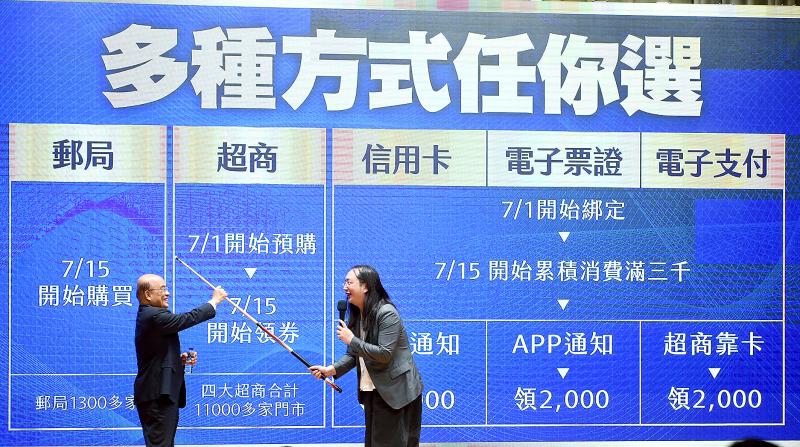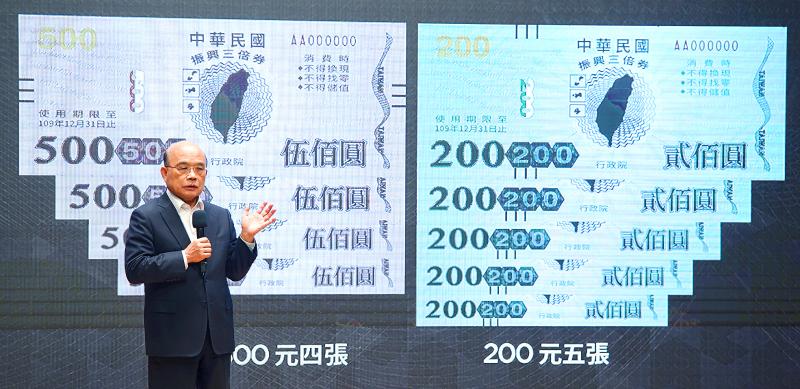Stimulus coupons for Taiwanese and foreign spouses with residency permits can be ordered starting on July 1 and can be used from July 15 to Dec. 31, the Executive Yuan said yesterday.
Aimed at boosting domestic spending, the coupons worth NT$3,000 (US$100.04) are to cost NT$1,000.
“For our consumers, this is a very good deal as they get three times as much value for their money,” Premier Su Tseng-chang (蘇貞昌) told a news conference in Taipei.

Photo: Liu Hsin-de, Taipei Times
While the coupons are to have a wide range of uses, including at department stores, restaurants, book stores, night markets, beauty and hair salons, hotels, and to purchase travel and concert tickets, they cannot be used to pay for online purchases, taxes, fines, cigarettes, stock bonds, insurance, credit card loans, pensions, gift cards or to store value.
“Each of the more than 23 million Taiwanese is eligible for a coupon; so are the 150,000 foreign and Chinese spouses with residency permits in Taiwan,” Su said, adding that to benefit the most people, the government has not set an age limit.
The coupons are to come in paper and digital form, with the latter comprising mobile payments, electronic tickets and credit cards.

Photo: Liu Hsin-de, Taipei Times
“Similar to the system for mask purchases, people can purchase the coupons at post offices upon presenting their National Health Insurance cards, starting on July 15,” Minister Without Portfolio Audrey Tang (唐鳳) said.
At NT$1,000 per unit, the coupons are to contain four coupons worth NT$500 each and five coupons worth NT$200 each.
Coupons ordered before the start date can be claimed after July 15 at the nation’s four convenience store chains: 7-Eleven, FamilyMart, OK Mart and Hi-Life, Tang said.
Consumers can also choose a digital payment option, Tang said.
“From July 1, people can choose to [link their coupon order to] either their credit card, a mobile payment service or electronic ticket, which would then record all purchases made … from July 15 onward,” Tang said.
“Once people have reached the NT$3,000 threshold … they will be notified and receive NT$2,000 in return,” she said, adding that the sum could either be transferred directly into people’s bank accounts or be deducted from their credit card bills.
A program to allow people to claim the NT$2,000 from an ATM is in development, the minister added.
For businesses and shops that would accept the coupons, Minister of Economic Affairs Shen Jong-chin (沈榮津) said that those equipped with government Uniform Invoice numbers could cash in the coupons at post offices and banks nationwide.
“Businesses without invoice numbers will be assisted by shopping districts, night market management committees and councils, which will cash in the coupons for them,” Shen added.
In total, the coupons are expected to generate up to NT$111.2 billion in value, the minister said.
“Local consumption is expected to reach NT$70 billion with the coupons alone, but mobile payment operators are also proposing 20 percent reductions, which would be even further amplified as businesses launch buy-one, get-one-free programs,” he said.

SECURITY: As China is ‘reshaping’ Hong Kong’s population, Taiwan must raise the eligibility threshold for applications from Hong Kongers, Chiu Chui-cheng said When Hong Kong and Macau citizens apply for residency in Taiwan, it would be under a new category that includes a “national security observation period,” Mainland Affairs Council (MAC) Minister Chiu Chui-cheng (邱垂正) said yesterday. President William Lai (賴清德) on March 13 announced 17 strategies to counter China’s aggression toward Taiwan, including incorporating national security considerations into the review process for residency applications from Hong Kong and Macau citizens. The situation in Hong Kong is constantly changing, Chiu said to media yesterday on the sidelines of the Taipei Technology Run hosted by the Taipei Neihu Technology Park Development Association. With

CARROT AND STICK: While unrelenting in its military threats, China attracted nearly 40,000 Taiwanese to over 400 business events last year Nearly 40,000 Taiwanese last year joined industry events in China, such as conferences and trade fairs, supported by the Chinese government, a study showed yesterday, as Beijing ramps up a charm offensive toward Taipei alongside military pressure. China has long taken a carrot-and-stick approach to Taiwan, threatening it with the prospect of military action while reaching out to those it believes are amenable to Beijing’s point of view. Taiwanese security officials are wary of what they see as Beijing’s influence campaigns to sway public opinion after Taipei and Beijing gradually resumed travel links halted by the COVID-19 pandemic, but the scale of

A US Marine Corps regiment equipped with Naval Strike Missiles (NSM) is set to participate in the upcoming Balikatan 25 exercise in the Luzon Strait, marking the system’s first-ever deployment in the Philippines. US and Philippine officials have separately confirmed that the Navy Marine Expeditionary Ship Interdiction System (NMESIS) — the mobile launch platform for the Naval Strike Missile — would take part in the joint exercise. The missiles are being deployed to “a strategic first island chain chokepoint” in the waters between Taiwan proper and the Philippines, US-based Naval News reported. “The Luzon Strait and Bashi Channel represent a critical access

Pope Francis is be laid to rest on Saturday after lying in state for three days in St Peter’s Basilica, where the faithful are expected to flock to pay their respects to history’s first Latin American pontiff. The cardinals met yesterday in the Vatican’s synod hall to chart the next steps before a conclave begins to choose Francis’ successor, as condolences poured in from around the world. According to current norms, the conclave must begin between May 5 and 10. The cardinals set the funeral for Saturday at 10am in St Peter’s Square, to be celebrated by the dean of the College